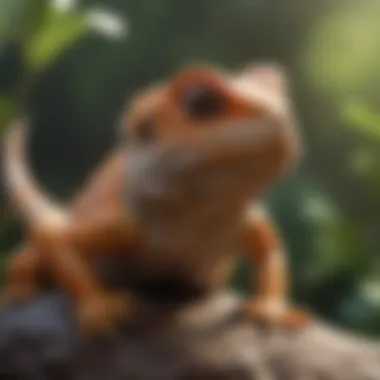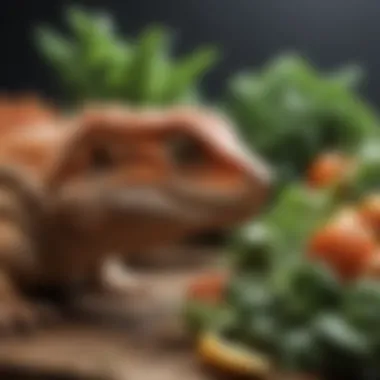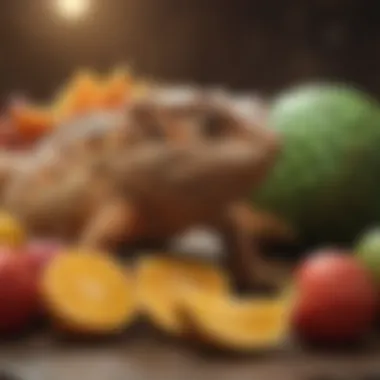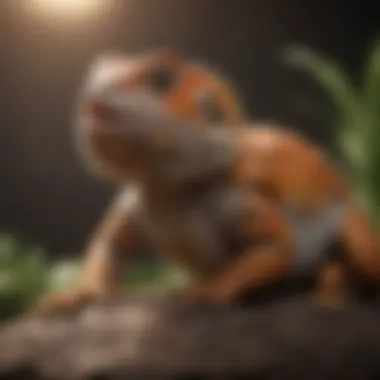Essential Dietary Guide for Bearded Dragons


Intro
Bearded dragons are fascinating reptiles that have gained significant popularity as pets. Understanding their dietary needs is crucial for their health and well-being. This article will dissect the specifics of what bearded dragons should eat, how to balance their diet, and common mistakes to avoid. Proper nutrition not only supports their growth but also enhances their quality of life, ensuring that they thrive in captivity.
Importance of Proper Nutrition
Adequate nutrition is vital for bearded dragons. These creatures rely on a varied diet to obtain essential nutrients. Their health can decline if they are not provided with the necessary balance of insects, vegetables, and fruits. Moreover, inadequate food choices can lead to metabolic bone disease, obesity, or other serious health issues. Therefore, recognizing what constitutes a balanced diet is foundational for any bearded dragon owner.
Understanding Bearded Dragon Dietary Preferences
Bearded dragons are omnivorous. This means their diet includes both animal and plant matter. Generally, younger dragons require more protein than adults. Insects like crickets, mealworms, and dubia roaches are excellent protein sources. It's important for owners to rotate these insects to prevent dietary deficiencies. Furthermore, adult bearded dragons should incorporate more vegetables and limited fruits into their diet.
Key Food Categories
- Insects:
- Vegetables:
- Fruits (occasionally):
- Crickets
- Dubia roaches
- Waxworms (in small amounts)
- Collard greens
- Mustard greens
- Bell peppers
- Blueberries
- Strawberries
- Mango
This structure ensures that bearded dragons receive a comprehensive range of nutrients required for optimal health. It is essential to avoid feeding inappropriate items such as iceberg lettuce, as it provides little nutritional value and might even cause digestive issues.
Common Dietary Mistakes
Many new bearded dragon owners make dietary errors. One common mistake is feeding too many insects. This can lead to obesity and related health issues. Additionally, not providing enough variety in vegetables can result in vitamin deficiencies. The importance of hydration also cannot be overstated. Fresh water should always be provided, and regular baths can help with hydration.
Proper nutrition acts as a preventive measure against many health issues for bearded dragons.
Feeding Frequency Recommendations
The frequency of feeding will depend on the dragon's age. For hatchlings and young dragons, feeding them daily is crucial. They need their calorie intake to support rapid growth. For adults, feeding every other day is often sufficient. However, close observation of their body condition can help in making feeding adjustments.
Epilogue
Preface to Bearded Dragon Nutrition
Bearded dragons are among the most popular reptiles kept as pets due to their docile nature and unique appearance. However, it is essential to understand their dietary needs for ensuring their health and vitality. Proper nutrition is a key component in promoting longevity and preventing common health issues. This section will present the importance of bearded dragon nutrition, touching on the variety of nutrients they require and the right proportions of food types to achieve a balanced diet.
Importance of a Balanced Diet
A balanced diet is crucial for bearded dragons. Unlike other pets, reptiles have specific requirements that differ substantially from mammals. They require a diet that consists primarily of insects, supplemented by a variety of vegetables and occasional fruits. The correct balance of these foods aids in digestion, promotes growth, and helps in sustaining energy levels.
Reptiles rely on calcium and vitamin D3 for maintaining strong bones. Without these nutrients, they are at risk of developing Metabolic Bone Disease, a condition that may lead to deformities or even death. Therefore, understanding the dietary needs and providing a well-rounded diet is not merely beneficial but essential for the well-being of bearded dragons.
Common Misconceptions
There are several misconceptions surrounding the diet of bearded dragons that can lead to poor nutritional practices. One common belief is that they can thrive solely on insects. While insects are indeed an important part of their diet, they cannot provide all necessary nutrients alone. A diet lacking in vegetables can lead to serious health problems.


Another incorrect assumption is that all fruits and vegetables are suitable for bearded dragons. For instance, certain leafy greens like iceberg lettuce provide little nutritional value and can actually cause digestive issues. Furthermore, some owners think that bearded dragons do not need as much water, leading them to neglect hydration. Dehydration is a serious concern and can affect their overall health.
Addressing these misconceptions is important for promoting a more informed approach to bearded dragon care. By dispelling myths and emphasizing the need for a diverse diet, owners can support the health and happiness of their pets more effectively.
Types of Food for Bearded Dragons
The dietary needs of bearded dragons are best met through a well-balanced mix of food types. This section delves into the various categories of food that should be part of their diet. Understanding these types will help ensure that bearded dragons receive the essential nutrients they need for healthy growth and development.
Insects
Insects form a significant part of the bearded dragon's diet, especially in their younger stages. They are high in protein and help in muscle development. Let's explore different types of insects often included in their meals.
Cricetids
Cricetids, commonly known as crickets, are popular feeder insects for bearded dragons. High in protein and low in fat, these insects are a staple. They have an appealing crunch when eaten, which many dragons enjoy. Crickets are also shed in the wild, making them a natural option. However, it is crucial to provide properly sized crickets, as larger sizes may pose a choking hazard.
Mealworms
Mealworms are another favorite among dragon keepers. These larvae are high in calories but also contain a good amount of protein. They can serve as excellent treats, but they should not be the sole diet. One downside is that mealworms have a high fat content compared to other insects. This means moderation is key to prevent weight gain.
Superworms
Superworms are larger than mealworms and are a good protein source. They are relatively easy to care for and can thrive on simple foods like oats. Dragons typically enjoy the movement of superworms, which can stimulate their hunting instincts. However, they also carry a higher fat content, so it’s advisable to treat superworms as an occasional offering rather than a daily staple.
Vegetables
Vegetables are crucial for providing essential vitamins and minerals. They add variety to the diet and should make up a significant portion of what bearded dragons eat. Here are some key options to consider.
Dark Leafy Greens
Dark leafy greens such as collard greens, kale, and dandelion greens are vital for bearded dragons. They are rich in calcium and other important vitamins. The texture and taste are appealing, and these greens can be offered fresh daily. However, some greens contain oxalates, which can bind calcium, making it less available. It's important to include varied options.
Root Vegetables
Root vegetables like carrots and squash are nutritious for bearded dragons. They provide necessary carbohydrates and are often sweeter, making them appealing. However, root vegetables should be offered in moderation, as they can be high in sugar. Always chop them into small, manageable pieces for easier consumption.
Other Vegetables
Other vegetables, including bell peppers and zucchini, can be included in the diet as well. They add additional vitamins and minerals. These vegetables can be offered in different forms - cooked, raw, or shredded. It's essential to maintain variety and keep track of what your dragon enjoys most.
Fruits
Fruits should only be a small part of a bearded dragon's diet due to their higher sugar content. However, they are still an enjoyable addition when used properly. Here’s how fruits fit in.
Repeating Fruits in Diet
Incorporating fruits like strawberries and blueberries can be a delightful treat for bearded dragons. They are rich in vitamins but can be high in sugars. It’s vital to offer fruits sparingly and avoid repeating the same fruits too often to ensure a balanced intake of nutrients. Observing your dragon's reaction to different fruits can help identify their preferences.
Fruit Treats
Fruit treats can serve as occasional rewards during training or feeding. They stimulate the dragon’s interest in food and provide mental enrichment, which is important. It's crucial to prep fruits appropriately to avoid any choking hazards. Cut them into small bites and ensure they are fresh, and avoid dried fruits, which may have added sugars.


In summary, a varied diet of insects, vegetables, and fruits ensures that bearded dragons receive the comprehensive nutrition necessary for their health and well-being. By understanding each food type and its benefits, you can create a balanced meal plan that meets their dietary needs.
Feeding Frequency and Portion Sizes
Age-Based Feeding Guidelines
Hatchlings to Juveniles
Hatchlings and juveniles have specific dietary requirements that are crucial to their growth and development. Young bearded dragons typically need to eat more frequently than adults due to their rapid metabolism and growth rate. A key characteristic of this life stage is their higher protein needs to support muscle and bone development.
During the first few months, bearded dragons should be fed two to three times a day. This ensures they are getting enough nutrients to sustain their growth, as well as vital energy. They benefit from variety, particularly from insects and greens, which contribute to a balanced diet.
A unique feature of feeding hatchlings and juveniles is their eagerness to eat insects. Offering smaller insects like crickets or small mealworms can be advantageous. However, caregivers should monitor portion sizes closely, as overfeeding at this stage can lead to obesity later in life.
Adults
As bearded dragons mature into adults, their feeding needs change significantly. Adult bearded dragons typically require fewer meals per day, usually one meal, which can be larger. The key characteristic of adults is their lower metabolism compared to younger dragons.
Adult bearded dragons should primarily focus on a diet rich in leafy greens with limited insects, as too much protein can lead to health issues such as obesity. It is recommended that adults be fed around three to five times a week, depending on their activity levels and overall health.
One unique aspect is that adult bearded dragons can also eat a wider variety of vegetables, which should make up the majority of their diet. Portion sizes should still be monitored to ensure they do not gain excessive weight, which often leads to serious health implications.
Signs of Overfeeding
Recognizing the signs of overfeeding is crucial for maintaining the health of bearded dragons. Common indicators include lethargy, weight gain, and a noticeable round belly. It's essential to monitor not just the quantity of food but also the frequency at which your bearded dragon is eating.
An overfed dragon may also show decreased activity levels and reluctance to explore its environment. This not only affects their physical health but can impact their mental and emotional state as well. Pet owners must stay vigilant and adjust feeding practices as necessary to match their bearded dragon's unique needs.
Nutritional Supplements
In the quest to maintain optimal health for bearded dragons, nutritional supplements play a pivotal role. These creatures require specific vitamins and minerals that may not be adequately provided through their diet alone. As pet owners conduct their research about bearded dragon care, understanding the significance of supplements becomes paramount. The two primary types of supplements worthy of attention are calcium supplements and vitamin D3. Both are essential for preventing deficiencies that can ultimately lead to serious health conditions.
Calcium Supplements
Calcium is vital for the development and maintenance of strong bones in bearded dragons. Its importance cannot be overstated, as inadequate calcium intake can lead to metabolic bone disease, a common ailment in reptiles. This condition weakens the bones, making them fragile and susceptible to fractures.
Pet owners should aim to provide a calcium supplement that is designed specifically for reptiles. The most effective form is calcium carbonate, as it is easily absorbed. Sprinkling this powder on insects before feeding can ensure that the bearded dragon receives the proper amount needed for their growth and overall health.
Vitamin D3
Vitamin D3 serves as a companion to calcium, facilitating its absorption in the body. When bearded dragons do not receive adequate exposure to UVB light, they may struggle to produce enough vitamin D3 naturally. This deficiency can further exacerbate calcium deficiency, leading to severe health problems.
When selecting a vitamin D3 supplement, it is crucial to choose one that is formulated for reptiles. Some calcium supplements come combined with vitamin D3, which simplifies supplementation. However, it's important to monitor dosage, as too much vitamin D3 can have adverse effects. Regularly checking the behavioral changes in your bearded dragon can be indicative of their overall health and well-being.
Common Dietary Mistakes
Understanding the common dietary mistakes made by bearded dragon owners is essential for the health and longevity of these reptiles. Addressing these errors not only ensures a balanced and nutritious diet but also prevents various health issues related to improper feeding. Knowing what to avoid is as important as knowing what to include in their diet.
Feeding Only Insects


One of the most prevalent mistakes amongst bearded dragon owners is the assumption that a diet consisting exclusively of insects is sufficient. While insects are an important protein source, they do not provide the vitamins and nutrients necessary for a balanced diet. Insects alone lack the required amounts of calcium, which is vital for bone health.
Furthermore, bearded dragons require a variety of nutrients that can only be found in vegetables and fruits. Feeding primarily insects can lead to nutritional deficiencies, such as metabolic bone disease, which is characterized by weak bones and deformity. Gradually introducing leafy greens and some fruits into the diet will help create a more balanced and nutritious intake.
Neglecting Vegetables and Fruits
Another common error is the neglect of vegetables and fruits. Bearded dragons need a mixture of various food types to thrive. Dark leafy greens like collard greens, dandelion greens, and turnip greens are crucial. These vegetables provide necessary vitamins and minerals. Fruits such as berries, melon, and papaya should be offered but only in moderation due to their sugar content.
A lack of these food types can cause severe deficiencies and adversely affect your bearded dragon’s health. For example, without the right vegetables, the calcium-to-phosphorus ratio may become unbalanced, leading to health complications over time. Always ensure to add a variety of vegetables and fruits to the diet to avoid this common mistake.
Inadequate Hydration
Hydration is often overlooked when it comes to bearded dragon care. Providing adequate water is essential. While bearded dragons may obtain some moisture from their food, it is not always sufficient. Owners should be attentive to their reptile's hydration needs by providing fresh water daily. Additionally, misting the habitat can help maintain humidity levels which can aid in hydration.
Signs of dehydration can include lethargy, wrinkled skin, and sunken eyes. To prevent these issues, providing a shallow water dish that is changed regularly is crucial, along with ensuring they receive moisture-rich foods such as cucumbers or peppers.
It’s critical to recognize and correct common dietary mistakes when caring for bearded dragons. These creatures have specific needs that must be met for them to thrive.
By addressing these frequent pitfalls in diet, bearded dragon owners can significantly improve the health and well-being of their pets.
Health Implications of Poor Nutrition
Nutrition plays a critical role in the health of bearded dragons. Poor dietary choices can lead to significant health issues, affecting their overall well-being and longevity. Understanding the health implications of inadequate nutrition is vital for any pet owner who wishes to ensure their bearded dragon thrives. Two of the most concerning conditions arising from such practices include metabolic bone disease and obesity, both of which have specific causes and effects.
Metabolic Bone Disease
Metabolic bone disease (MBD) is a serious condition that primarily results from a deficiency in calcium, vitamin D3, or inappropriate levels of both in the diet. Bearded dragons require a delicate balance of these nutrients to maintain strong bones and prevent various skeletal deformities.
Inadequate exposure to UVB lighting, which is essential for vitamin D3 synthesis, can exacerbate this issue. Without proper calcium levels, the dragon's body may start to leach calcium from the bones, leading to weakened and brittle skeletal structures. The symptoms can include lethargy, tremors, and deformities, which can severely impact the dragon's quality of life.
"Ensuring your bearded dragon receives adequate calcium and vitamin D3 is crucial to preventing metabolic bone disease."
The treatment often requires veterinary intervention, including dietary changes and possibly supplements. Educating oneself about the signs of MBD significantly aids in early detection, fostering a more favorable outcome.
Obesity
Obesity is another pressing concern that arises from improper feeding practices. When bearded dragons consume excessive amounts of high-fat insects or are simply overfed relative to their needs, they can quickly gain weight. Obesity not only impacts the dragon's physical appearance but can also raise the likelihood of other health complications.
Excess weight can lead to a host of issues including heart disease, liver problems, and reduced mobility. Symptoms may include difficulty in movement, decreased appetite, and lethargy.
To combat obesity, it is essential to monitor food portions and ensure a balanced diet, diversifying food types while maintaining appropriate calorie levels. Adjusting feeding schedules and incorporating more vegetables can help in establishing a healthier weight.
Ending
In this article, we highlighted critical aspects of bearded dragon nutrition. Understanding what your bearded dragon eats is paramount for its health and longevity. This knowledge is not just for casual pet owners but is also crucial for serious breeders and enthusiasts.
Bearded dragons thrive when provided a balanced diet consisting of insects, vegetables, and fruits. A well-rounded diet supports their growth, helps maintain a healthy weight, and prevents diseases. Nutritional deficiencies can lead to serious health issues like Metabolic Bone Disease and obesity, which can be avoided with the right feeding approach.
Summary of Key Points
- Balanced Diet: A mixture of insects, vegetables, and fruits is necessary for proper nutrition.
- Feeding Frequency: Different ages require different feeding schedules. Hatchlings may need daily feedings, while adult dragons can have less frequent meals.
- Common Mistakes: Avoid only feeding insects or neglecting hydration, which can severely impact health.
- Supplements: Calcium and Vitamin D3 supplements are essential for healthy bone development.
- Awareness of Health Risks: Be cautious of signs of overfeeding or metabolic disorders, leading to chronic health problems.
Encouragement for Ongoing Education
The journey of understanding bearded dragon nutrition does not end here. Continued learning and adapting feeding practices is crucial. Pet owners should stay informed about new research and recommendations in reptile care.
Engage with communities on platforms such as Reddit or Facebook to share experiences and gain insights. Valuable resources like Wikipedia and Britannica also provide updated information about bearded dragon diets. Be proactive in exploring these avenues; the better information you have, the better care you can provide.
Investing time in education will benefit not just your bearded dragon but also deepen your appreciation for these remarkable creatures. Knowledge is the foundation for enhancing their quality of life.















